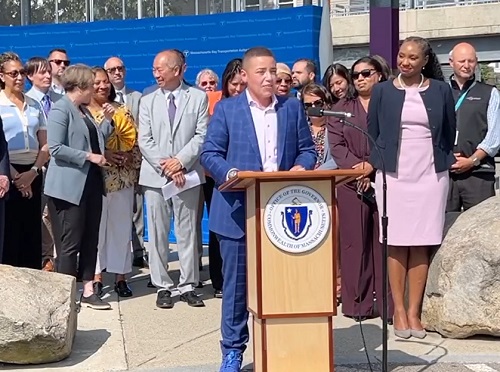The Massachusetts Bay Transportation Authority – a division of Massachusetts Department of Transportation – recently signed off on a $54 million plan to introduce battery-electric multiple unit or BEMU trains to the Fairmount Commuter Rail Line. The first of those BEMU trains are scheduled to go into operation in early 2028.
[Above photo by MassDOT]
Keolis Commuter Services, the company that operates MBTA commuter rail lines, will begin the design and procurement process with the goal of delivering enough BEMU trains to operate 20-minute train service along the line. At just over nine miles long, the Fairmount line is the shortest of the 12 commuter rail lines, serving 3,200 passengers a day.
In a statement, MassDOT Secretary Monica Tibbits-Nutt called the move to BEMU trains “a milestone moment” as the transit agency “prepares to begin operating the first of what will be dozens” of new BEMU trains. MBTA serves more than 100,000 rail commuters a week.
MassDOT pointed out that moving the entire Fairmount line from diesel to battery-electric service will save 1.6 million gallons of fuel and mitigate 17,700 tons of carbon dioxide a year. Besides emitting less air pollution, the BEMU trains will be faster, quieter, smoother, and will give passengers more space for a “modernized commuting experience,” the agency said.
[Editor’s note: In April, the Nevada Department of Transportation hosted a groundbreaking event for the Brightline West High-Speed Rail Project; a 218-mile all-electric rail line that will operate between Las Vegas and Rancho Cucamonga, CA. The agency received $3 billion in funding from the USDOT’s Federal-State Partnership for Intercity Passenger Rail Grant Program in December 2023 to help build this Brightline West electric rail line, which the company expects will open in 2028. That grant brings the total federal support for project up to $6.5 billion in grants and financing.]
Commute times should be cut from 30 minutes to about 20 minutes because the electric trains can accelerate faster out of each of the nine stations along the route, MassDOT noted. People who live near the commuter line, yards, and maintenance facility should experience less noise and vibration from the new trains, according to the release.
BEMU trains are powered by on-board batteries that are recharged by overhead catenary wires. Instead of locomotives pulling passenger cars, the batteries and motors will be integrated into four-car fixed sets. Once the design is finalized, engineers can determine seating capacities, which will be one factor in deciding exactly how many trains will be needed.
Eventually, MassDOT and MBTA want to convert the entire commuter rail system to electric trains, but it’s not financially feasible to do that right now, according to MBTA General Manager Phillip Eng.
“Understanding that billions of dollars are needed to fully electrify our entire system, we are proud to find a way to bring electrification to this corridor sooner within available fund sources,” Eng said. “This work will help inform us as we strive to improve and decarbonize our service on all of our regional rail network.”

- The Stream Podcast Examines Noise Reduction Efforts
- Environmental News Highlights – September 18, 2024
